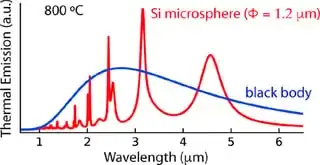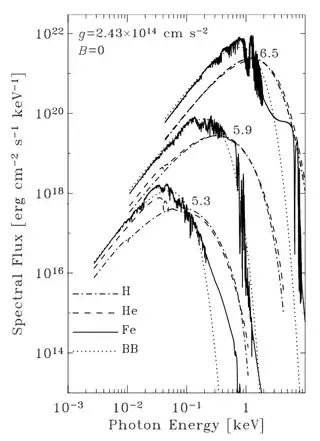We know that any blackbody that has a certain non-zero temperature radiates. This happens due to the jiggling of charged particles (protons and electrons), and accelerated charges create electromagnetic radiation. My question is, if (hypothetically), we have something made solely of neutrons, will it not radiate (as neutrons are not charged) when heated and thus not follow the Blackbody radiation curve?
4 Answers
Neutrons will radiate:
- firstly because they have magnetic dipole moment which couples them to electromagnetic field
- also they will radiate other bosonic fields - whatever they are coupled to
Under appropriate conditions the emitted radiation will come to equilibrium and will have black-body spectrum.
Remark: Generally charged particles radiate electromagnetic waves - they don't have to be a part of a black body or radiate black body radiation. (BBR is radiation in thermal equilibrium, while BB is an object that absorbs all the radiation incident on it, which was historically used to derive BBR distribution, but not really needed for this in the quantum era. See, e.g., Black body vs. Thermal radiation, Does thermal energy include the energy of thermal radiation as part of its definition?)
- 68,984
The black body radiation curve holds for an idealised black body. Such a body has electromagnetically active internal degrees of freedom at all frequencies. In practice not many materials conform to this. See for example silicon microsphere thermal emission at 800C
Neutron stars have atmospheres of very hot gas and these are predicted to emit radiation that crudely agrees with the black body curve.
However, they also emit non thermal radiation which dominates when they are still hot.
- 27,443
Something that cannot emit photons cannot absorb photons and therefore clearly could not emit a blackbody spectrum and could not reach any kind of equilibrium with a radiation field.
However an object made mostly of neutrons can interact with electromagnetic radiation and therefore, assuming it is thick enough to absorb all radiation it would approximately emit blackbody radiation.
I emphasise mostly because you can't have stable bulk material made only of neutrons. A proportion will decay into protons and electrons, which decidedly do interact strongly with photons.
- 141,325
For now: dark matter, though cold, does not emit EM radiation. Same for neutrinos. A supernova has a hot blob of neutrinos (even blackbody neutrinos), but they are not coupling to photons AFAIK. Hot neutrons in heavy ion collision do emit thermal pions, tho.
- 42,131

